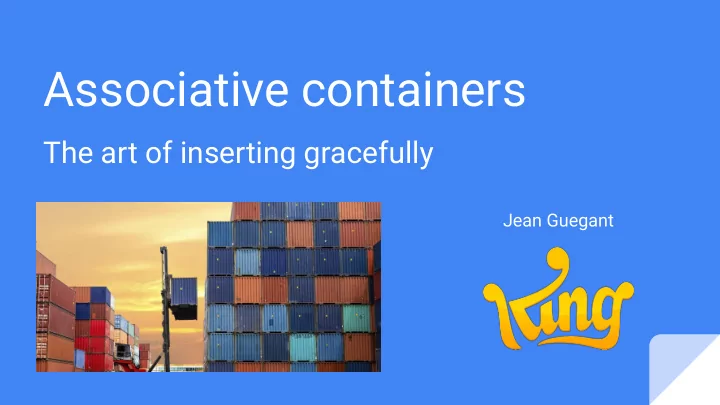

Associative containers The art of inserting gracefully Jean Guegant
Conditional insertion: if not already in there
Overlookuping : overlooking the lookups std::unordered_map<std::string, aclass> cache; auto it = cache.find(key); if (it == cache.end()) { cache[key] = aclass(desc); } return cache[key];
Overlookuping : overlooking the lookups std::unordered_map<std::string, aclass> cache; auto it = cache.find(key); if (it == cache.end()) { cache[key] = aclass(desc); } return cache[key];
Overlookuping : overlooking the lookups SLOW std::unordered_map<std::string, aclass> cache; auto it = cache.find(key); if (it == cache.end()) { cache[key] = aclass(desc); } return cache[key];
C++98 auto result = cache. insert ( std::pair<std::string, aclass>( key, desc ) ); return result.first->second;
C++98 SLOW auto result = cache. insert ( std::pair<std::string, aclass>( key, desc ) ); return result.first->second;
C++11 auto result = cache. emplace (key, desc); return result.first->second;
C++11 SLOW auto result = cache. emplace (key, desc); return result.first->second;
Effects : Inserts a value_ type object t constructed with The amazing standard std::forward<Args>(args)... if and only if there is no element in the container with key equivalent to the key of t. The bool component of the quoting interlude returned pair is true if and only if the insertion takes place, and the iterator component of the pair points to the element with key equivalent to the key of t. What the F***... What about the failure case? Am I reading? Cppreference : The element may be constructed even if there already is an element with the key in the container, in which case the newly constructed element will be destroyed immediately.
HOMO CPLUSPLUS COMMITUS
C++17 auto [it, success] = cache. try_emplace (key, desc); return it->second;
C++17 FINE auto [it, success] = cache. try_emplace (key, desc); return it->second;
> Smart pointers joins the game!
Back to square one std::unordered_map<std::string, std:: unique_ptr <aclass>> cache; auto [it, success] = cache.try_emplace(key, std:: make_unique <aclass>(desc)); Allocate & construct
Back to square one SLOW std::unordered_map<std::string, std:: unique_ptr <aclass>> cache; auto [it, success] = cache.try_emplace(key, std:: make_unique <aclass>(desc)); Allocate & construct
Exception safety auto [it, success] = cache. try_emplace (key, nullptr ); if (success) { it->second = std::make_unique<aclass>(desc); }
Exception safety auto [it, success] = cache. try_emplace (key, nullptr ); if (success) { it->second = std::make_unique<aclass>(desc); } What if there is an exception?
Exception safety DANGEROUS auto [it, success] = cache. try_emplace (key, nullptr ); if (success) { it->second = std::make_unique<aclass>(desc); } What if there is an exception?
So... I had an affair
Lazy arguments à la D
Lazy arguments à la D template<class Factory> struct lazy_arg { using result_type = std::invoke_result_t<const Factory&>; constexpr lazy_arg(Factory&& factory) : factory(std::move(factory)) { } constexpr operator result_type() const noexcept(std::is_nothrow_invocable_v<const Factory&>) { return factory(); } Factory factory; };
Lazy arguments à la D template<class Factory> struct lazy_arg { using result_type = std::invoke_result_t<const Factory&>; constexpr lazy_arg(Factory&& factory) : factory(std::move(factory)) { } constexpr operator result_type() const noexcept(std::is_nothrow_invocable_v<const Factory&>) { return factory(); } Factory factory; }; Call a callable and return its result
Lazy arguments à la D auto arg = lazy_arg([&desc](){ return std::make_unique<aclass>(desc); }); cache.try_emplace(key, std::move(arg)); Award: works with C++17
Factory method à la Rust auto factory = [&desc](){ return std::make_unique<desc>(desc) }; cache. try_emplace_with (key, std::move(factory)); Award: neat but unavailable
in_place constructors for smart pointers cache.try_emplace(key, proposal:: allocate_in_place <aclass>{}, desc); Award: can be used with CTAD (Class Template Argument Deduction) auto ptr = std::unique_ptr(proposal:: allocate_in_place <aclass>{}, desc); == auto ptr = std::make_unique<aclass>(desc);
Thanks
Charming the committee
A recipe for bugs std::string key = "fiction"; auto result = cache.emplace(std::move(key), desc); if (!result.second) { std::cout << "There was an issue with " << key; } return result.first->second;
A recipe for bugs SLOW & DANGEROUS std::string key = "fiction"; auto result = cache.emplace(std::move(key), desc); if (!result.second) { std::cout << "There was an issue with " << key ; } return result.first->second;
Conditional insertion Associative containers (such as std::map, std::unordered_map...) have seen their interface (or concept) evolve quite a bit along the C++ standards: a lot more lookup and modifiers member functions are now available in C++20 than in C++98. While some of these operations were added mostly for convenience, quite a few of them brought more expressiveness and improved performance alongside. For example: try_emplace (C++17) has more guarantees than emplace (C++11) on what happen to a r-value key , emplace_hint (C++11) can be more efficient with the help of the user, et cetera. During this lightning talk, we will have a quick recap on some changes added along the years and the best practices when using associative containers. We will slowly reach the conclusion that the current interface for associative containers still has limitations. An associative container storing values of type unique_ptr make it difficult to express conditional insertion of such unique_ptrs into it in an efficient and elegant way! We will then see how to palliate this problem in a pure C++17 manner. Then, we will explore how the standard could potentially evolve the associative container interface one more time to help us. We will also compare how other languages tackle that issue in their own way.
Recommend
More recommend